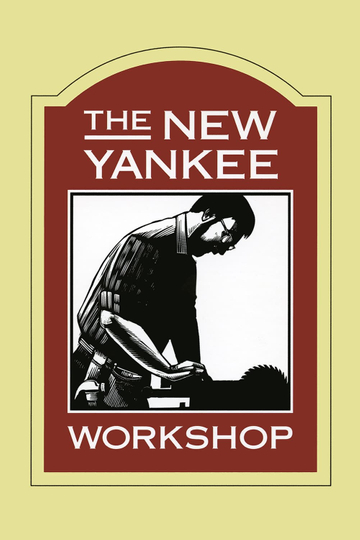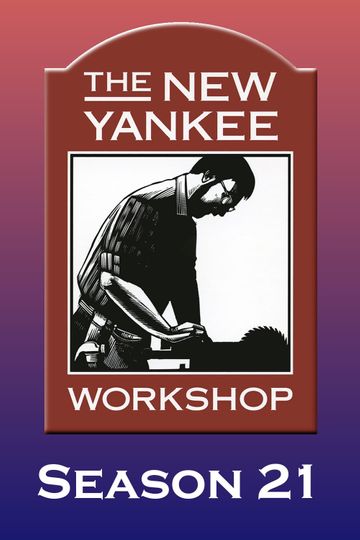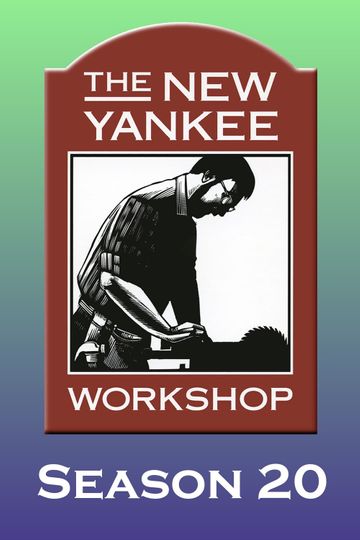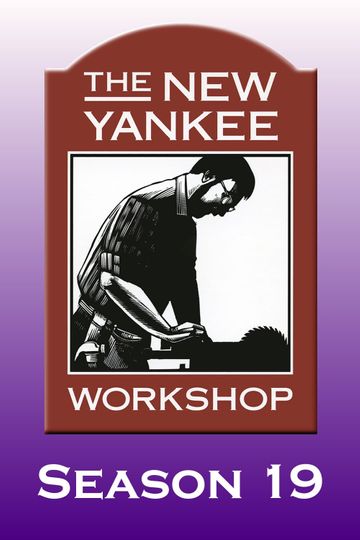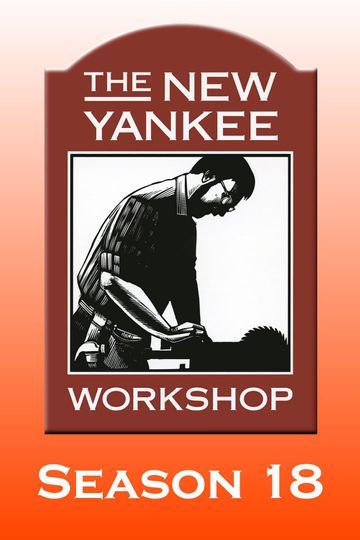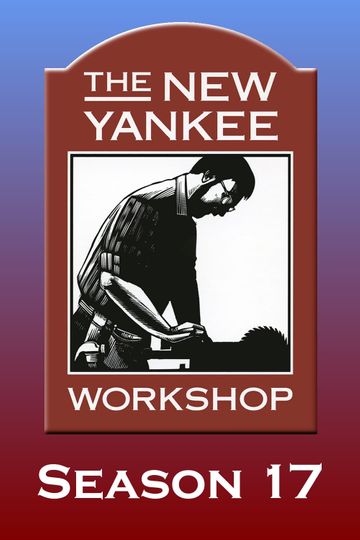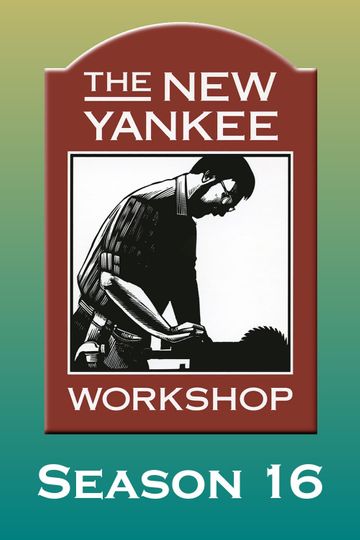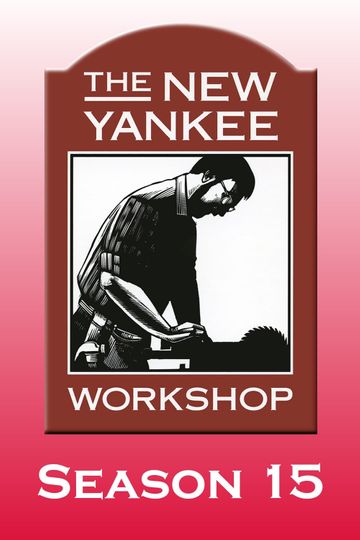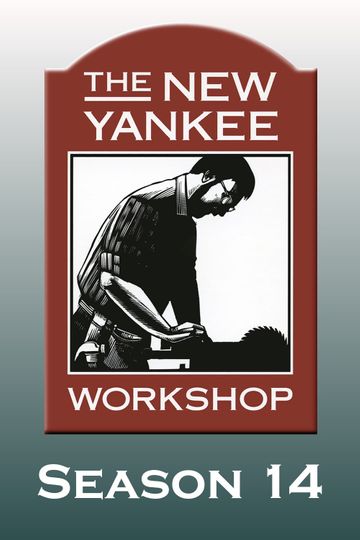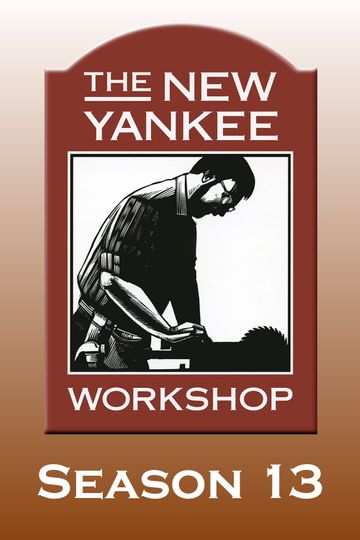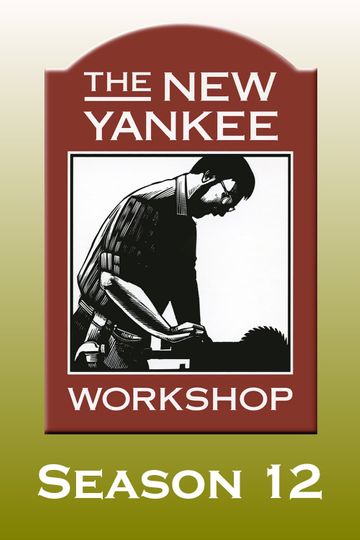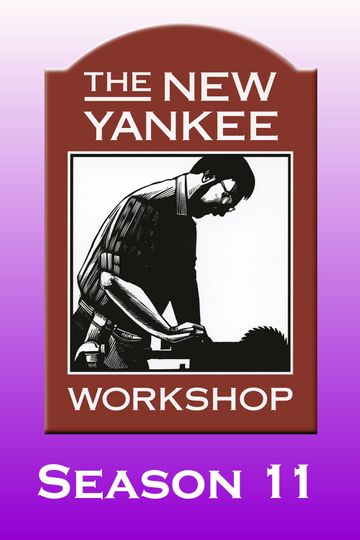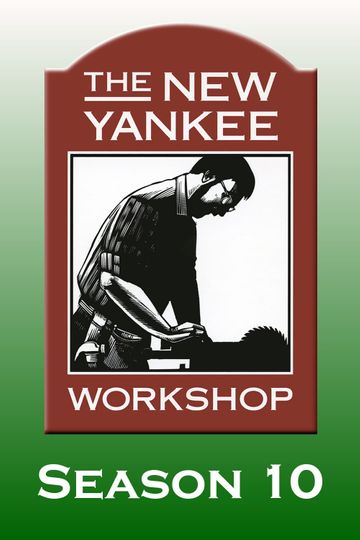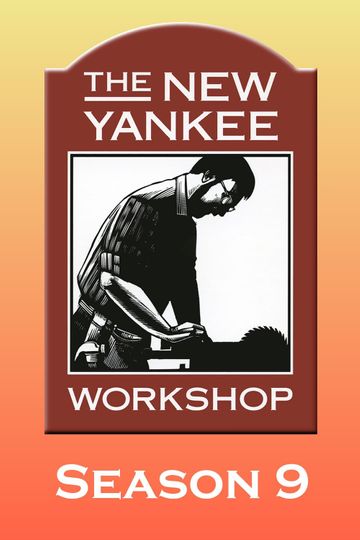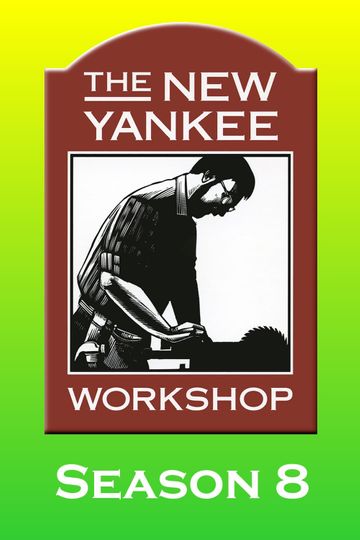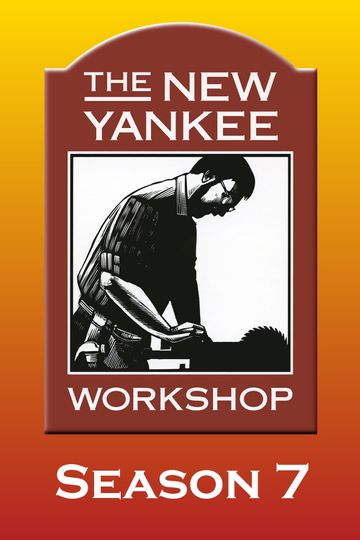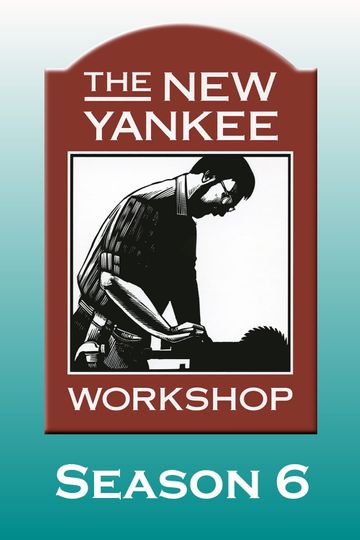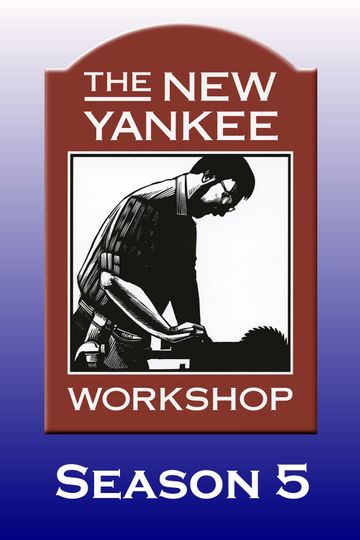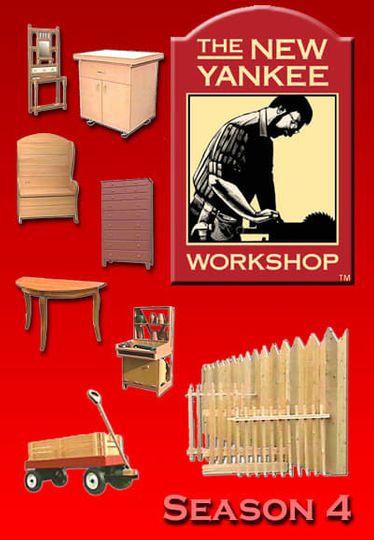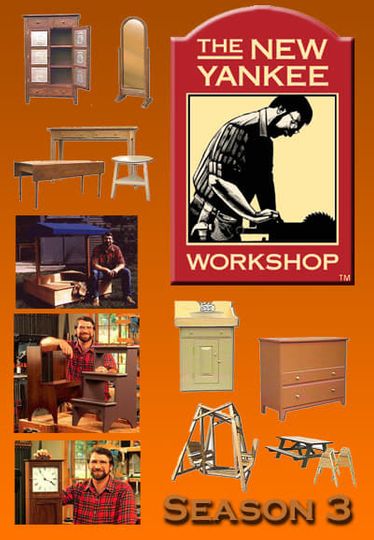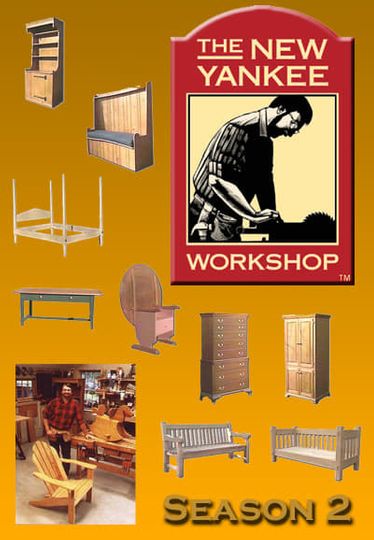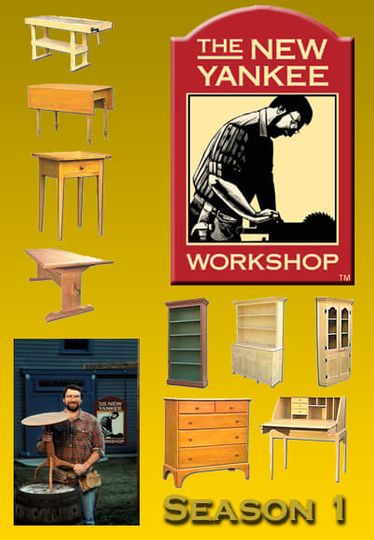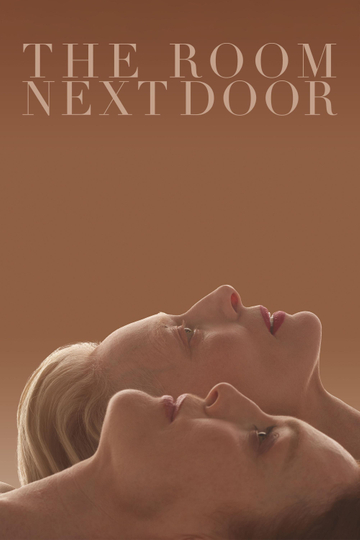Season 19 Plot
Norm builds a giltwood mirror, an entrance door and bowfront chest out of mahogany, an old pine dry sink, a cherry candlestand, a painted Dominy clock, a cowboy sideboard, a painted cupboard, a decoratively-painted taunton chest, a nest of tables, and an upholstered window bench. For "shop tools and techniques", he spends two episodes demonstrating the use of the table saw.
The New Yankee Workshop Season 19 aired on January 6th, 2007.
Season 19 Episodes
1. Giltwood Mirror
One of the most challenging projects ever attempted on The New Yankee Workshop comes when Norm tries his hand at reproducing a Federal-style Giltwood Mirror. It isn't the woodworking that is particularly difficult. Norm makes that part seem easy. It's trying to gild the mirror with gold leaf and make the frame appear as solid gold that takes time, patience, and lots of skill. Norm picks up the history of Giltwood and sees some remarkable examples when antiques expert Gary Sullivan discusses his collection. Then, Norm visits Linda Abrams a gilder and reverse painter for an understanding of what it takes to turn wood into gold.
2. Entrance Door
It would be hard to think of a more important element of a home's appeal than its entranceway. But all too often, modern doors are an unremarkable (yet necessary) feature quickly forgotten by those who pass through them. Not so with this custom-made, mahogany beauty that Norm creates in The New Yankee Workshop. He designs and builds it from scratch for an old house that cries out for a new door. Along the way, he is able to find a pair of antique looking "Bulls Eye" glass inserts and a handsome brass knob and lock to set off this masterpiece.
3. Old Pine Dry Sink
Arlington House sits high above the National Cemetery in Virginia as an imposing witness to historic events. Once the home of Robert E. Lee, it survives today under the watchful care of the National Park Service and is brimming with antiques of the Civil War era. Historic records prove that, at one time, the estate owned 63 slaves, some of whom worked in the kitchen. Lots of the tools and everyday objects they would have used still take up residence in the house, including a painted Old Pine Dry Sink. Norm notices it immediately and decides to build one himself out of recycled pine. However, the only water Norm's dry sink will ever see is from tending the houseplants he intends to display on its copper top.
4. Martha's Candlestand
To see Martha Washington's bedroom, you'll have to talk to the Ladies of Mount Vernon, who look after the first President's mansion near the Potomac River. Although not officially on the tour of Mount Vernon, the Ladies agree to take Norm to parts of the old house that the public rarely sees. In one such room, the third floor bedroom that Martha took after George died, Norm comes across a handsome candlestand that sits near the bed. Upon further inspection, he discovers that it is a diminutive, wellcrafted stand complete with a wooden "birdcage" element that allows the tabletop to rotate and flip up for storage. Before he leaves Mount Vernon, Norm works with a sawyer of historic wood, William Jewell, to obtain some cherry (what else?) harvested from one of the estate's fallen trees.
5. Dominy Clock
Without dispute, one of the greatest collections of American antiques resides at the Winterthur Museum in Delaware. One of the Museum's most popular displays, the original workshops of the Dominy family, quickly draws Norm's attention. The Dominys were clock and cabinetmakers who worked in eastern Long Island from the 1730s to the 1830s, creating high-quality clocks and furniture. Norm visits the exhibit and selects a clock, circa 1821, from the Dominy collection to reproduce back in the Workshop. Inspired by the Dominy clock, and up for the woodworking challenge, Norm builds his own simple tall case clock out of poplar and paints it to resemble the original.
6. Cowboy Sideboard
Wyoming antiques dealer Terry Winchell wants everybody to know about the remarkable work of furniture designer Thomas Molesworth. In the 1930s, from his base in Cody, Wyoming, Molesworth created "Cowboy"-style furnishings made from peeled Douglas fir logs, stretched red leather, and routed out images of Indian teepees, animal tracks, and shooting irons. Dwight Eisenhower was a fan of this particularly distinctive dude ranch furniture, as was Thomas Yawkey (once the owner of Norm's beloved Red Sox). Today, Molesworth is very collectible, as Norm finds out when he visits Winchell at his operation in Jackson Hole. The ultimate New England craftsman brings a little bit of Western sensibility into his Yankee workshop when he decides to take on a Molesworth-style sideboard for his own collection.
7. Painted Cupboard
Little is known about the handsome Painted Cupboard, which resides in one of the period rooms in the elegant country estate at the Winterthur Museum in Delaware. On a guided tour with Director of Conservation Gregory Landrey, Norm discovers the cupboard and is drawn to its scale, the unusual arched top door, and the "pinched" cornice that towers above the case. Norm will build his own version to the same dimensions back at The New Yankee Workshop and even matches the green blue paint on the exterior and the wine red color used for the interior.
8. Table Saw 101 (1)
As with his previous programs dedicated to a single tool, Norm takes viewers on a special two-part program that explores the usefulness of the table saw. He begins by showing various table saws and what they can do and goes on to describe and demonstrate adjustments to make them more accurate. In the first program, he concentrates on the most common task a table saw will be asked to do - ripping. Norm discusses how to do it safely and accurately. He demonstrates his technique for cutting large panels and shows a safe way to handle narrow stock. He completes show number one by building an ingenious "out feed" table -- so clever every saw owner will want one. This is part 1 of 2.
9. Table Saw 101 (2)
As with his previous programs dedicated to a single tool, Norm takes viewers on a special two-part program that explores the usefulness of the table saw. He begins by showing various table saws and what they can do and goes on to describe and demonstrate adjustments to make them more accurate. In the second part of Table Saw 101, Norm goes on to demonstrate dadoing, setting up stacked dado cutters, the making of rabbets, and the building of a sacrificial fence. Then he turns to evaluating miter gauges and shows how they may be used to make precision miters. He demonstrates the process of making accurate tenons with a factory-built jig. In the same program, he builds a cross cut sled and a stop block that extends any table saw's potential. This is part 2 of 2.
10. Taunton Chest
The Museum of Fine Arts, Boston is a treasure house of the first order that boasts remarkable collections of early American furniture, including some incomparable pieces by Goddard and Townsend, the famous Colonial-era Rhode Island furniture makers. Norm is drawn to a simple chest that is undergoing laboratory investigation at the museum. Known as the Taunton Chest, the piece was named for the Massachusetts town where Robert Crosman (1710-1799) built it nearly three hundred years ago. This highly decorated small chest is one of only a handful of Crosman originals that remain intact today. One like it was offered by Christie's Auction House not long ago and went for the amazing sum of close to three million. Norm builds his version out of poplar and calls on decorative artist Natalie Gardner to precisely copy the paintwork of the original design.
11. Bowfront Chest
Recently, Norm, who is a trustee of the Old Sturbridge Village museum, asked the curators to put a stunning Bowfront Chest they had in storage on display in one of the Village's historic homes, the Salem Towne House, to inspire his New Yankee viewers. The stunning Bowfront four-drawer chest was built by Alden Spooner working in nearby Athol, Massachusetts in 1807. Spooner, like many furniture makers of the time, was probably well aware of pattern books and high-style designs being made in Europe and America, and this chest may well have been inspired by furniture brought here from Great Britain. Norm builds his version of mahogany and is challenged to form the French feet and the dovetailed Bowfront drawers. While not a project for a beginner, the Bowfront Chest will be of great interest to serious woodworkers.
12. Nest of Tables
Prowling antiques stores for a suitable project for his own living room, Norm encounters Matt Buckley, an appraiser and antiques expert, who shows him an interesting Nest of Tables. Unlike anything else he has built on the show, Norm is intrigued by these three small mahogany tables that store into one another to form a "nest". The example that Matt shows Norm are likely to be English circa 1920 and are derived from the "Chippendale" style. Norm decides to build his own versions from walnut and mahogany and he reproduces the fine inlay details of the original.
13. Window Bench
Gary Sullivan, an antiques expert and an old friend of The New Yankee Workshop, shows Norm an antique Window Bench probably built in the early 19th century. Although it doesn't appear to be in good condition with it's tattered upholstery, Gary tells Norm he wouldn't consider restoring this "rare" example of what he believes is a "museum quality" bench. "You don't expect to see more than a handful of these in a lifetime," he explains to Norm. The simple bench is little more than an upholstered seat with two rolled arms on dark wooden legs. Such benches are meant to be used at a window to frame the view or, perhaps, at the end of a bed to sit and relax. Norm calls upon the experts at Lee Industries, the fine furniture manufacturers, who come up from their base in North Carolina to help Norm upholster his version of the Window Bench. The result is handsome and very comfortable.










